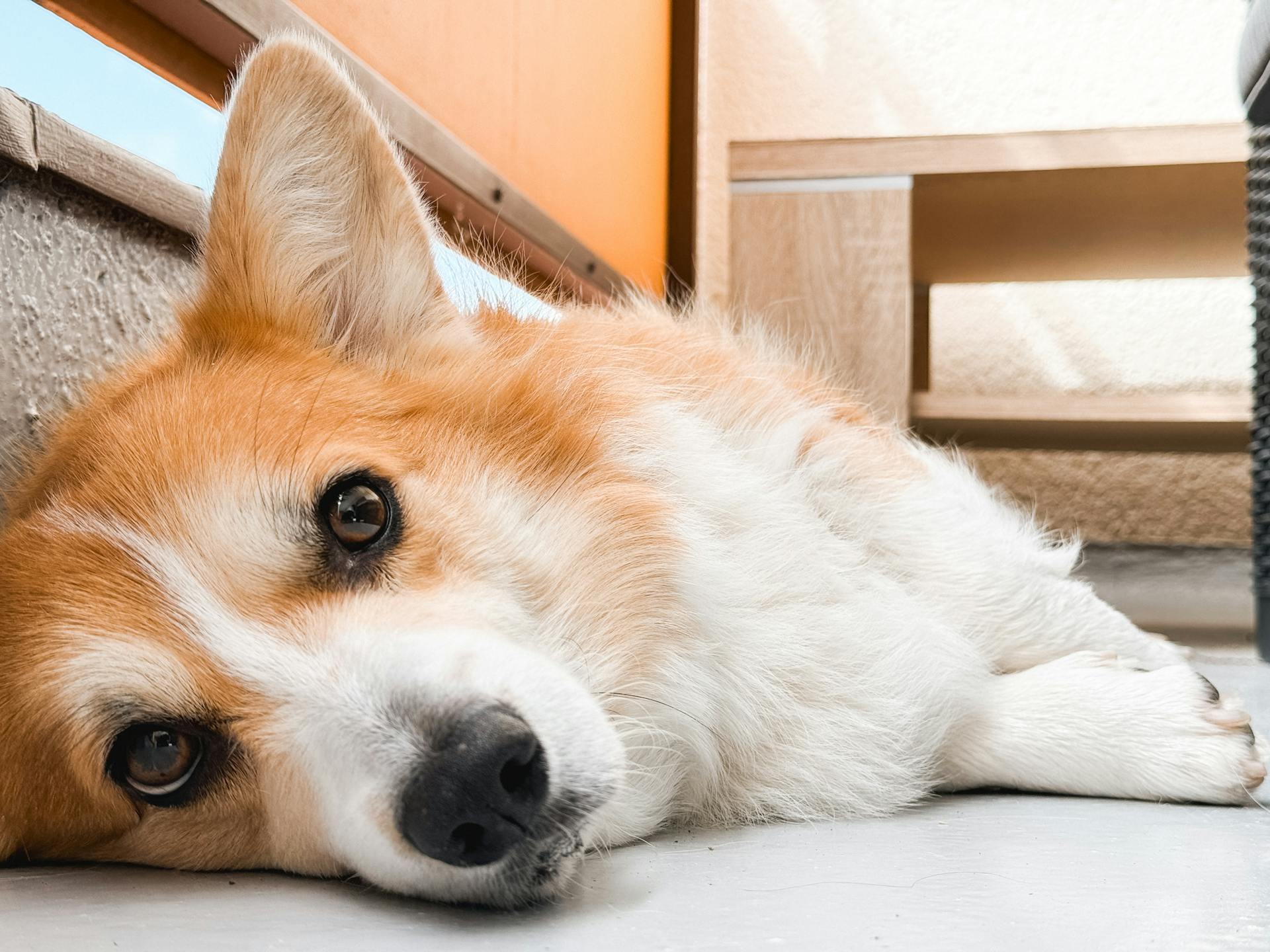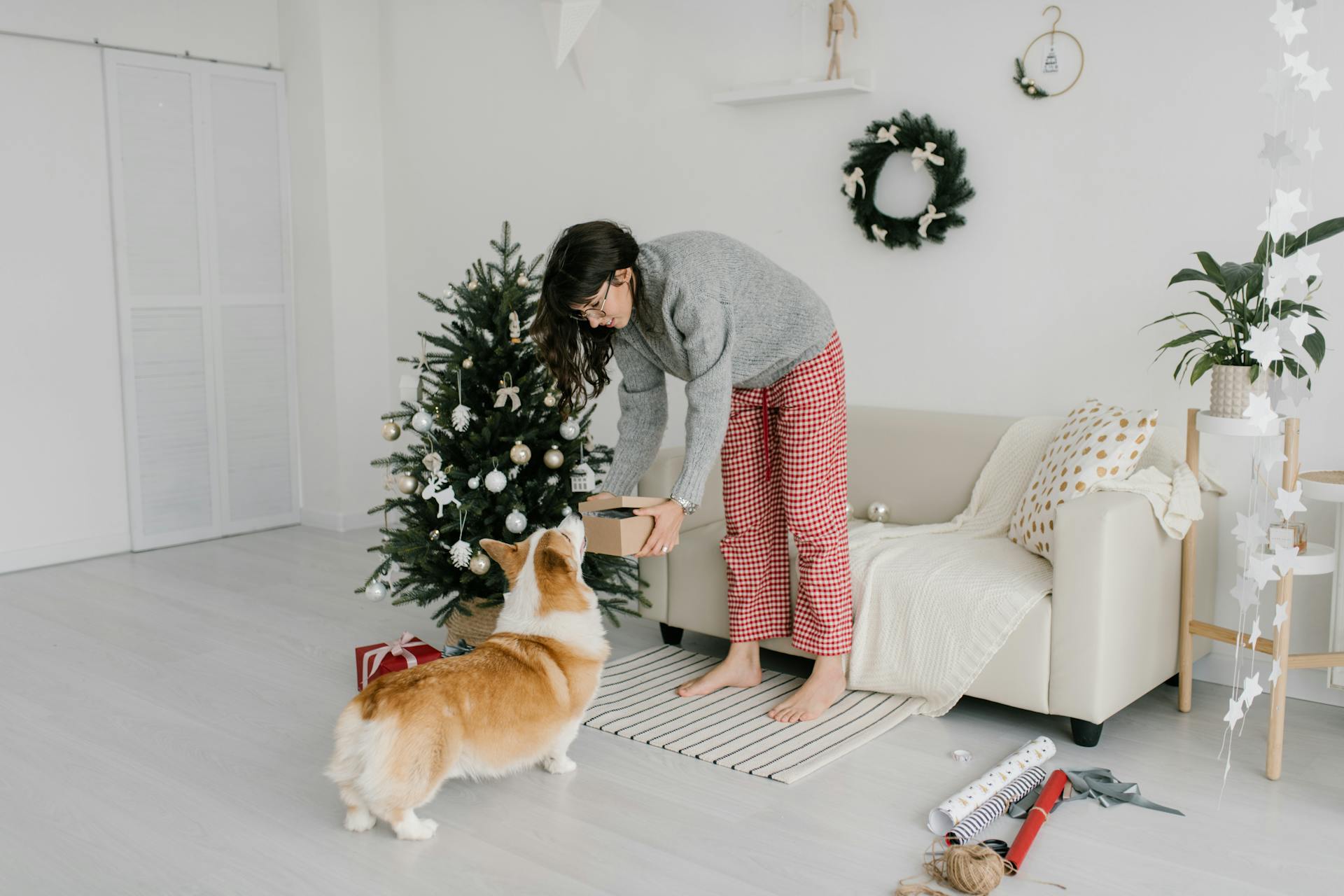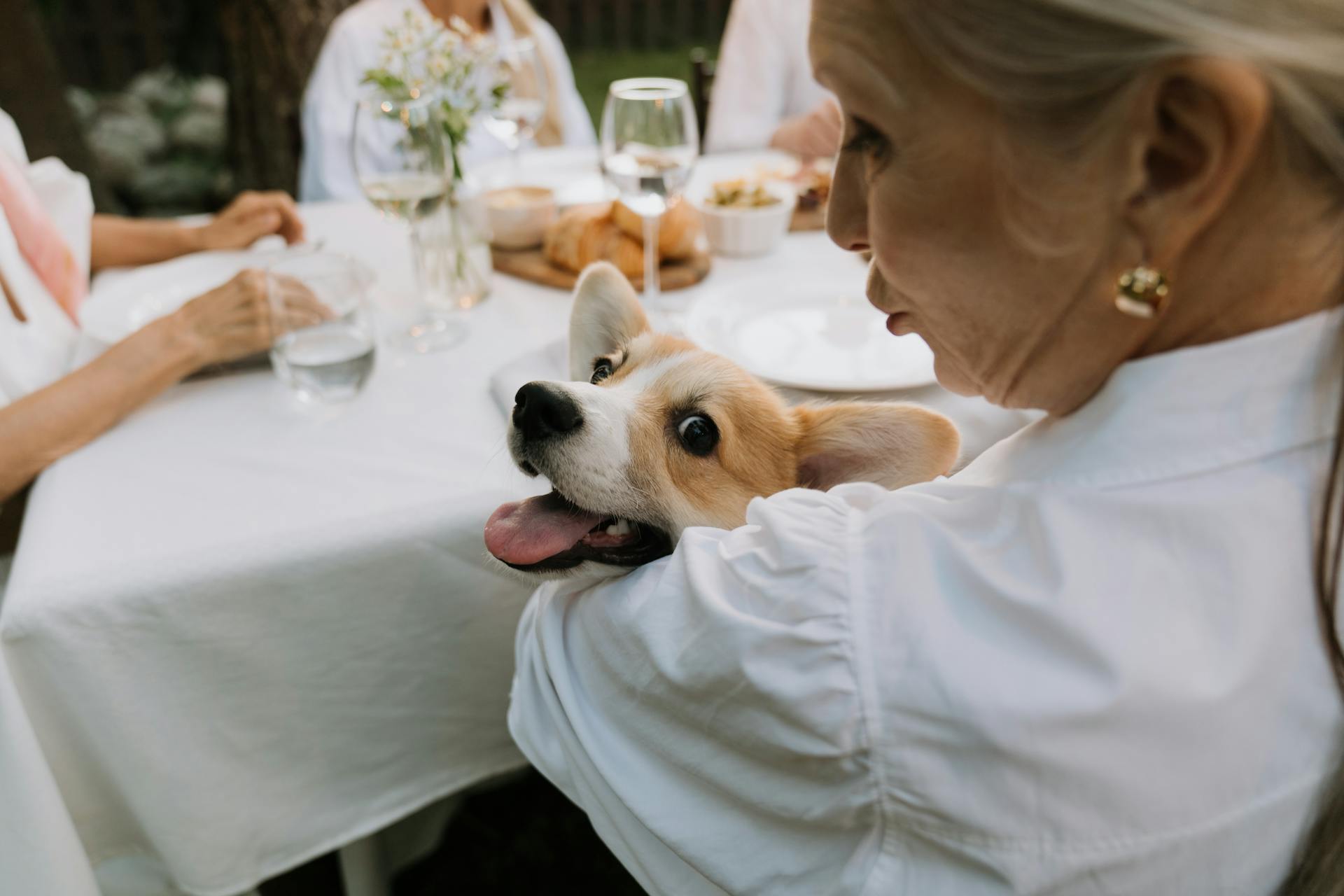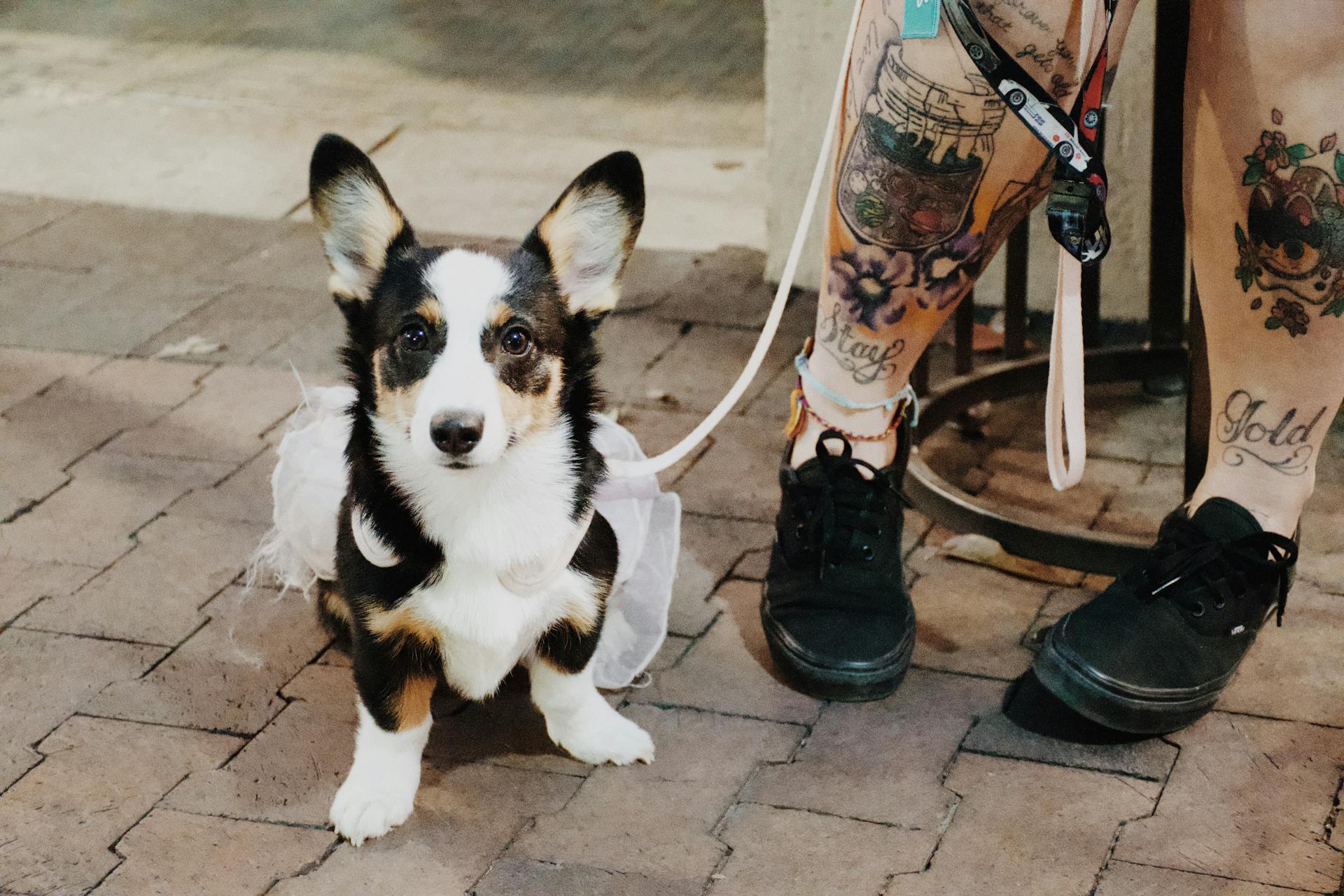
Welsh Corgis are intelligent dogs that thrive on structure and clear communication. They require consistent training to reach their full potential.
To start, it's essential to establish a routine that includes regular feeding times, exercise, and play. This helps Welsh Corgis feel secure and develop good habits.
Housebreaking is a crucial aspect of Welsh Corgi training, as they have a strong instinct to hold their bladder and bowels. Welsh Corgis can learn to eliminate outside with proper training and supervision.
Positive reinforcement is a key training method for Welsh Corgis, as they respond well to rewards and praise. This approach encourages good behavior and avoids punishment or negative reinforcement.
Broaden your view: Dogs Breeds That Start with B
Welsh Corgi Temperament and Training
Welsh Corgis are incredibly intelligent dogs, and they were once trained to do work around the farm. They're capable of learning the ropes of nearly any job that you want to give them.
Their high energy level and zest for life make them a great match for active families. Both Pembroke and Cardigan Welsh Corgis are resilient breeds that will certainly fill your days with entertainment and affection.
The Corgi's friendly and intelligent nature makes them excellent candidates for service dogs. They can be easily trained and are patient enough to undergo extensive training.
With consistent training and mental stimulation, Welsh Corgis can excel in obedience, agility, and herding trials. They're quick learners and respond well to positive reinforcement methods.
Here's a summary of the key characteristics of Welsh Corgis:
- Temperament: Affectionate, Smart, Alert
- AKC Breed Popularity: Ranks 13 of 195
- Height: 10-12 inches
- Weight: up to 30 pounds (male), up to 28 pounds (female)
- Life Expectancy: 12-13 years
- Group: Herding Group
Welsh Corgi Puppy Training
Training a Welsh Corgi puppy can be a breeze for others, but it all depends on your overall technique, expertise, and patience level. You can train your pup to do all kinds of things, but you probably just want to do the basics first, like having a well-mannered pup that can go to the bathroom outside.
Keep your training simple and consistent, using a singular word, preferably one syllable, for commands like sit, stay, and down. This will stick better in your dog's mind.
To prevent accidents, start small with crate time, beginning with 5 minutes and working your way up.
Puppy
Welsh Corgi puppies require patience and consistency when it comes to training. You can train your pup to do all kinds of things, but start with the basics, like going to the bathroom outside.
To begin with, it's essential to establish a designated potty area, where your pup will associate with going to the bathroom. Pick a spot and stick to it, even if it means leaving some behind to help with recognition.
Training a Corgi puppy can be a breeze if you have the right technique and patience level. Keep in mind that you'll need to tailor the steps to match your particular situation.
Here are some key takeaways to keep in mind:
- Start small with short training sessions and gradually increase the time.
- Keep the training simple and consistent, using a singular word for commands like "sit" and "stay".
- Repeat and refresh often to help your pup catch on and prevent forgetting.
Remember, Corgis need mental and physical stimulation, so be prepared to keep them active through regular exercise routines and training classes.
Opting for Professional
Welsh Corgi puppy training can be a challenging but rewarding experience. Corgis are intelligent and friendly dogs, making them excellent candidates for service dogs.
If you're a novice or have an older Corgi, it might be best to opt for a professional trainer. This can speed up the training process and provide guided advice and demonstrations every step of the way.
A professional trainer can help you stay on task and assert your dominance in the situation while building up that bond with your dog. This is especially important as many human adults don't know how to assert themselves in an appropriate way to gain authority.
Having a professional on hand can be a great bonding experience for you and your dog. You'll learn how to command the action you want while your pet learns the ropes.
Prospective Owners
If you're considering bringing a Welsh Corgi into your family, choosing the right breed is crucial. You can choose from various breeds, but Welsh Corgis are a popular choice due to their intelligence and loyalty.
To get started with your new furry friend, you'll need to decide why you want a dog in the first place. Some people want a dog for companionship, while others want a dog for exercise or protection.
Finding a responsible breeder is essential to get a healthy puppy. Look for breeders who prioritize the health and well-being of their dogs, and who are transparent about the puppy's ancestry and temperament.
Getting started in dog sports can be a great way to bond with your Welsh Corgi and provide them with mental and physical stimulation. Activities like agility training and herding can be especially fun for Corgis.
Welsh Corgi puppies are a bundle of energy and curiosity, and they require special care and attention. All about puppies, you'll want to make sure you're prepared for the challenges and joys of raising a young Corgi.
Housebreaking and Crate Training
Potty training can be a daunting process for any pet owner, but it's essential for your Welsh Corgi's well-being and your own sanity.
Corgi puppies are very smart, clean, and eager to please, making them easy to crate train. They're also very particular about where they sleep, which is why crate training is crucial for housebreaking.
See what others are reading: Crate Training an Australian Shepherd
To start, introduce your puppy to the crate by letting them get acclimated to it, going in and out, sniffing around, and exploring. The quicker they get used to the crate, the less anxiety it will give them.
You can make the crate comfortable and familiar by adding a few toys or some yummy treats. This will encourage your puppy to go inside and learn to eat comfortably with the door open. After all, you don't want this to be a place of punishment or to be associated with negative things.
A unique perspective: Dog Crate Training
Designate a Potty Area
Pick the place where you're going to take your pup, and make sure they associate it with going to the potty every time. This designated area will be their go-to spot for doing their business.
Even though poop scooping is a must, and some apartment complexes and condos make it essential, you might want to leave some behind when you're first starting. This allows your dog to go back to the area and smell it, remembering this was their potty spot last time.
Corgi puppies, being very smart and clean, will really want to do what you want to do, and this includes going to their designated potty area. They're very easy to crate train, and they rarely poop in their crate.
Related reading: House Training with a Crate
Crate and House Break-In
Crate training is a must for Corgi puppies, as they can't hold their pee for long periods, especially if they're tiny. Many puppies will get into trouble if left unsupervised.
You can't expect a puppy to hold their pee for 8 hours while you're at work, so crate training is a must. Crate training and adult dogs can go a few different ways, but it's especially challenging for dogs that have never been in a crate before.
Corgi puppies are very smart and clean, and they really want to please their owners. They're very easy to crate train, and they rarely poop in their crate, even if they wet it.
To make crate training a positive experience, let your puppy get acclimated to the crate by putting them inside, letting them go in and out, and letting them sniff around. This will help them feel comfortable and reduce anxiety.
You can make the crate comfortable and familiar by adding a few toys or some yummy treats. This will encourage your puppy to go inside and learn to eat comfortably with the door open.
Crate training is an essential part of housebreaking puppies, as dogs don't like to soil where they sleep. Potty training can be daunting, but with patience and consistency, you can help your puppy learn to go outside.
Discover more: Can Shiba Inu Reach 1 Dollar
Frequently Asked Questions
Are Welsh corgis good for beginners?
Welsh Corgis can make great first-time pets due to their affectionate nature and small size. They're a great choice for beginners who want a loving and adaptable companion.
Are Pembroke corgis easy to train?
Yes, Pembroke corgis are known for their high intelligence and trainability, making them relatively easy to train with positive reinforcement and consistent instruction. With patience and practice, they can learn a wide range of commands and tricks.
Can Pembroke Welsh corgis be left alone?
Yes, Pembroke Welsh corgis can be left alone at home, but it's essential to consider their exercise and social needs to ensure they stay happy and healthy.
At what age do Corgis calm down?
Corgis typically calm down between 1-2 years of age, but their temperament is also influenced by training, activity levels, and stimulation. Proper care and socialization can help your Corgi develop a calm and well-adjusted personality.
Sources
- https://www.dogster.com/dog-training/corgi-training
- https://alaskadogworks.com/how-to-train-a-pembroke-welsh-corgi/
- https://www.akc.org/expert-advice/training/train-corgi-corgi-puppy-training-timeline/
- https://www.akc.org/dog-breeds/pembroke-welsh-corgi/
- https://iheartdogs.com/most-intelligent-trainable-dog-breeds/
Featured Images: pexels.com


